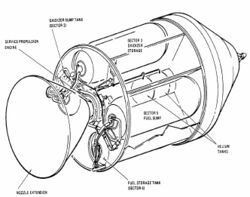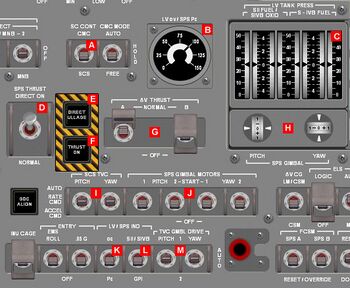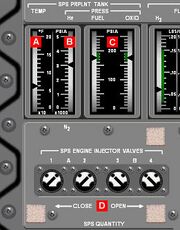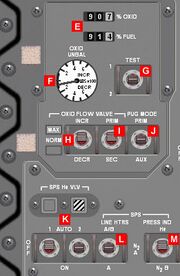Service Propulsion System: Difference between revisions
imported>Tschachim mNo edit summary |
imported>Tschachim No edit summary |
||
| Line 9: | Line 9: | ||
== Engine thrust on/off logic == | == Engine thrust on/off logic == | ||
[[Image:SPS_switch_location_3.jpg|thumb|350px|right|Location of SPS displays & controls on panel {{Panel label|name=1}} | [[Image:SPS_switch_location_3.jpg|thumb|350px|right|Location of SPS displays & controls on panel 1, lower part{{Panel label|name=1}}]] | ||
In ''[[First Steps#Standard mode|Standard mode]]'' and ''[[First Steps#Virtual AGC mode|Virtual AGC mode]]'' the SPS engine works like the real thing, that means as specified in the original documentation<cite>AOH</cite>. So the real SPS engine isn't throttleable, it only can be turned on or off by opening or closing one or both of the two pairs of engine injector valves (bipropellant valve systems A or B) {{Panel label|name=3.D}} pneumatically. The gaseous nitrogen pressure of valve system A and B {{Panel label|name=3.B}} can be monitored by switching the SPS-PRESS IND switch {{Panel label|name=3.M}} to N<sub>2</sub> A or N<sub>2</sub> B. | In ''[[First Steps#Standard mode|Standard mode]]'' and ''[[First Steps#Virtual AGC mode|Virtual AGC mode]]'' the SPS engine works like the real thing, that means as specified in the original documentation<cite>AOH</cite>. So the real SPS engine isn't throttleable, it only can be turned on or off by opening or closing one or both of the two pairs of engine injector valves (bipropellant valve systems A or B){{Panel label|name=3.D}} pneumatically. The gaseous nitrogen pressure of valve system A and B{{Panel label|name=3.B}} can be monitored by switching the SPS-PRESS IND switch{{Panel label|name=3.M}} to N<sub>2</sub> A or N<sub>2</sub> B. | ||
In order to fire the SPS engine, the ΔV THRUST A and/or ΔV THRUST B switches {{Panel label|name=1.G}} are unguarded and switched to NORMAL ("single/double bank operation") to arm the control logic for engine injector valve system A or B.<cite>I</cite> Now there are 3 ways or thrust modes to fire the engine: | In order to fire the SPS engine, the ΔV THRUST A and/or ΔV THRUST B switches {{Panel label|name=1.G}} are unguarded and switched to NORMAL ("single/double bank operation") to arm the control logic for engine injector valve system A or B.<cite>I</cite> Now there are 3 ways or thrust modes to fire the engine: | ||
| Line 17: | Line 17: | ||
=== SPS thrust direct on mode === | === SPS thrust direct on mode === | ||
The SPS engine is designed to be very reliable, so the easiest way to fire the engine, just in case everything else failed, is to switch the SPS THRUST switch{{Panel label|name=3.M}} to DIRECT ON. It can be stopped again by switching back to NORMAL. | |||
=== CMC ΔV mode === | === CMC ΔV mode === | ||
The normal way to control the SPS engine is to use the [[:Category:Apollo_Guidance_Computer|Command Module Computer]]. The [[Virtual AGC]] uses program P40 to both provide the thrust on signal and to control the SPS thrust vector. The [[C AGC]] has a couple of fictional programs to support the different mission phases. For both CMC versions the SC CONT switch{{Panel label|name=1.A}} is switched to CMC. | |||
[[Image:SPS_switch_location_1.jpg|thumb|180px|right|Location of SPS displays & controls on panel 3, upper part{{Panel label|name=3}}]] | |||
=== SCS ΔV mode === | === SCS ΔV mode === | ||
| Line 31: | Line 35: | ||
== Propellant utilization == | == Propellant utilization == | ||
[[Image:SPS_switch_location_2.jpg|thumb|180px|right|Location of SPS displays & controls on panel {{Panel label|name=3}} | [[Image:SPS_switch_location_2.jpg|thumb|180px|right|Location of SPS displays & controls on panel 3, lower part{{Panel label|name=3}}]] | ||
Revision as of 00:19, 17 November 2006

The Service Propulsion System (SPS) is the Command/Service Module main engine and provides the impulse for all velocity changes (ΔVs) throughout a mission and the SPS abort capability after the launch escape tower is jettisoned. The engine uses Aerozine 50 (hydrazine/UDMH) fuel and nitrogen tetroxide oxidizer and has a maximum thrust of 20,500 lbf (91.2 kN). This hypergolic fuel combination is pressurized with helium during thrusting periods, so no propellant pump is needed. The propellant flow from the tanks to the thrust chamber is controlled by the engine injector valves, which are pneumatically controlled with nitrogen. The engine is gimbaled to allow thrust vector control during a burn.
Quickstart mode
In Quickstart mode the SPS engine works like a normal Orbiter main thruster. The engine can be throttled with the keyboard or Orbiter's joystick control as usual, although the real SPS engine isn't throttleable. The Interplanetary MFD (IMFD) autoburn program can be used, too. It's not necessary to use the panel displays and controls, the Orbiter engine displays can be used though the panel displays are enabled normally.
Engine thrust on/off logic

In Standard mode and Virtual AGC mode the SPS engine works like the real thing, that means as specified in the original documentationAOH. So the real SPS engine isn't throttleable, it only can be turned on or off by opening or closing one or both of the two pairs of engine injector valves (bipropellant valve systems A or B)3.D pneumatically. The gaseous nitrogen pressure of valve system A and B3.B can be monitored by switching the SPS-PRESS IND switch3.M to N2 A or N2 B.
In order to fire the SPS engine, the ΔV THRUST A and/or ΔV THRUST B switches 1.G are unguarded and switched to NORMAL ("single/double bank operation") to arm the control logic for engine injector valve system A or B.I Now there are 3 ways or thrust modes to fire the engine:
SPS thrust direct on mode
The SPS engine is designed to be very reliable, so the easiest way to fire the engine, just in case everything else failed, is to switch the SPS THRUST switch3.M to DIRECT ON. It can be stopped again by switching back to NORMAL.
CMC ΔV mode
The normal way to control the SPS engine is to use the Command Module Computer. The Virtual AGC uses program P40 to both provide the thrust on signal and to control the SPS thrust vector. The C AGC has a couple of fictional programs to support the different mission phases. For both CMC versions the SC CONT switch1.A is switched to CMC.

SCS ΔV mode
Thrust vector control
Propellant pressurisation
Propellant utilization

Thermal control
<biblio force=false>
#I The ΔV THRUST A/B switches receive power from the SPS PILOT VLV MNA/B circuit breakers on panel 8 to supply the engine injector valve system A/B. They also receive power from the SPS HE VLV MNA/MNB circuit breakers to power the injector prevalves A/B. Additionally they apply power for the SPS ready signal to the CMC. #References </biblio>